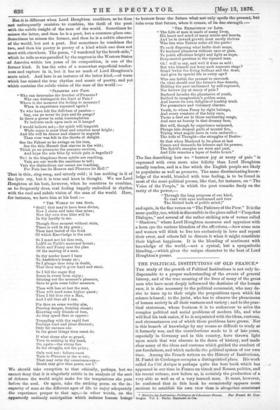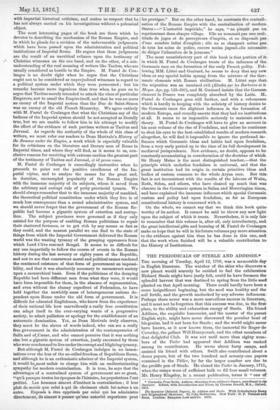THE POLITICAL INS1TrUTIONS OF OLD FRANCE.* THE study of the
growth of Political Institutions is not only in- dispensable to a proper understanding of the events of general history, and of the true meaning of the lives of many of the great men who have most deeply influenced the destinies of the human race, it is also necessary to the political economist, who may de- sire to trace up to their origin the propositions upon which his science is based ; to the jurist, who has to observe the phenomena of human society in all their vastness and variety ; and to the prac- tical statesman, whose business it is to endeavour to solve the complex political and social problems of modern life, and who will find his task easier, if he is acquainted with the ideas, customs, and circumstances out of which those problems have grown. Nor is this branch of knowledge by any means so difficult to study as it formerly was, and the contributions made to it of late years, especially in Germany and in this country, have thrown light upon much that was obscure in the dawn of history, and made clear many of the ideas and customs which guided the conduct of our forefathers, and which underlie the political system of our own time. Among the French writers on the History of Institutions, M. Fustel de Coulanges occupies a distinguished place. His work called La Cite Antique is perhaps quite the best book which has appeared in our time in France on Greek and Roman politics, and his recent volume, now before us, is certainly the production of a very able as well as of a very learned man. It must, however, be confessed that in this book he occasionally appears more anxious to establish his own view than is altogether consistent Histoire des Institution; Po7iliques de l'Ancienne France. Par Pastel de Con- lenges. Vol. I. Faris: Hachette et Cio.
with impartial historical criticism, and makes us suspect that he has not always carried on his investigations without a polemical object.
The most interesting pages of the book are those which he devotes to describing the mechanism of the Roman Empire, and in which be pleads for a revision of the unfavourable judgments which have been passed upon the administration and political institutions of Imperial Rome. He argues that these judgments are the result of an uncritical reliance upon the testimony of Christian witnesses on the one hand, and on the other, of a mis- understanding of the real meaning of writers like Tacitus, who are usually considered as hostile to the Empire. M. Fustel de Cou- langes is no doubt right when he urges that the Christians ought not to be considered as unprejudiced witnesses in regard to a political system under which they were persecuted ; but his remarks become more ingenious than true when he goes on to argue that Tacitus merely intended to attack the vices of particular Emperors, not to assail the Empire itself, and that he was no more an enemy of the Imperial system than the Duc de Saint-Simon was an enemy of the old French Monarchy. We agree entirely with M. Fustel de Coulanges that what the Christiana say of the badness of the Imperial system should be not accepted as literally true, but we are unable to follow him in his attempt to modify the effect of the evidence of such partisan writers as Tacitus and Juvenal. As regards the authority of the whole of this class of writers, we must refer our readers to Dean Merivale's History of the _Romans under the Empire, a work which is especially valuable for its criticisms on the literature and literary men of Rome in Imperial times, and where they will find, as it seems to us, con- clusive reasons for receiving with extreme caution the greatest part of the testimony of Tacittu3 and Juvenal, el id genus °nine.
M. Fustel de Coulanges is exceedingly instructive when he proceeds to point out the positive excellences of the Im- perial regime, and to analyse the causes for the great and, in duration, unexampled popularity of the Roman Empire with the immense majority of its subjects, whom it saved from the arbitrary and corrupt rule of petty provincial tyrants. We should always remember that to the immense majority of mankind, the theoretical political constitution under which they live is of much leas consequence than a sound administrative system, and we should never forget that the government of the Roman Re- public had become a gigantic system of extortion and corrup- tion. The subject provinces were governed as if they only existed for the purpose of enabling Roman politicians to repair their shattered fortunes, or to get rich by any means as fast as they could, and the nearest parallel we can find to the state of things from which the Imperial Government delivered the Roman world was the wasting tyranny of the grasping oppressors from which Lord Clive rescued BengaL It seems to us difficult for any one impartially to follow the course of events in the Roman history during the last seventy or eighty years of the Republic, and not to see that concurrent moral and political causes rendered the continued existence of that form of government an impossi- bility, and that it was absolutely necessary to reconstruct society upon a monarchical basis. Even if the politicians of the decaying Republic had been different men from what they were, it would have been impossible for them, in the absence of representation, and even without the clumsy expedient of Federation, to have held together the unwieldy mass of heterogeneous nations de- pendent upon Rome under the old form of government. It is difficult for educated Englishmen, who know from the experience of their national life how marvellously a really free constitution can adapt itself to the ever-varying wants of a progressive society, to admit palliation or apology for the establishment of an autocratic domination. Yet, as Dean Mexivale truly observes, they must be the slaves of words indeed, who can see a really free government in the administration of the contemporaries of Sulla and ofgasar, and who cannot perceive that it was nothing else but a gigantic system of extortion, justly execrated by those who were condemned to live under its corrupt and blighting tyranny.
But although M. Fustel de Coulanges indulges in no lamen- tations over the loss of the so-called freedom of Republican Rome, and although he is an enthusiastic admirer of the Imperial system, it would be.most unfair to charge him with an undiscriminating sympathy for modern centralisation. It is true, he says that the advantages of a centralised system of government are so great,
qu'a presque toutes les époques de l'histoire, lea populations l'ont prefer& Les hommes aiment d'instinct la centralisation ; il leur plait de savoir que celui a qui ils obeissent obeit lui-meme a un autre. Exposés k etre opprimes par celui qui lea administre directement, ils aimeat Is penser qu'une autorite superieure pent
lea proteger." But on the other hand, he contrasts the centrali- sation of the Roman Empire with the centralisation of modern States :—" L'autorite imperiale," he says, "ne placait pas un
repre:sentant dans cheque village. Elle ne nommait pas une mul- titude de juges et de percepteurs d'impots, et ne disposait pas d'une nombre infini d'emplois ; elle ne se chargeait meme pas- de tons lea soins de police, encore moms jugeait-elle necessaire- de diriger reducation de la jeunesse."
The most unsatisfactory part of this book is that portion of it in which M. Fustel de Coulanges treats of the influence of the Germanic race on the formation of the early French polity. Fol-.
lowing MM. Littre and Gu6rard, he seems to deny that any new ideas or any special habits sprang from the mixture of the Ger- manic elements with Roman civilisation. M. Littre says that.
the migration was an unmixed evil (Etudes sur lea Barbares et Is Moyen Age, pp. 125-200), and M. Guerard insists that the German
element in France was completely absorbed by the Latin. X.
Fustel de Coulanges goes still farther, and with a vehemence which is hardly in keeping with the sobriety of history denies to the Germanic races the slightest influence in the formation of modern Europe, and roundly asserts that they had no institutions at all. It seems to us impossible seriously to maintain such a• theory. M. Fustel de Coulanges will have to give an account in his next volume of the rise of Feudalism, and unless he continues to shut his eyes to the best-established results of modern research altogether, he will find it impossible to ignore the profound in- fluence which Germanic ideas and habits had upon feudalism,. from a very early period up to the time of its full development in medimval jurisprudence. New evidence, no doubt, appears to be- constantly accumulating in corroboration of the doctrine of which Sir Henry Maine is the most distinguished teacher,—that the
principle which underlies feudalism is universal, and that the- great institution had its origin in certain primitive ideas and bodies of custom common to the whole Aryan race. But this. fact is not inconsistent with the results of the labours of Weitz,. Roth, Sohm, and others, who have cleared up much that was obscure in the Germanic system in Saliaa and Merovingian times, , and, have explained the immense influence which special Germania. custom and policy had upon feudalism, as far as European, constitutional history is concerned with it.
On the whole, we cannot say that we think this book quite• worthy of its author. It cannot be said to throw any new light upon the subject of which it treats. Nevertheless, it is only fair-
to remember that this volume is, after all, only introductory, and the great intellectual gifts and learning of M. Fustel de Coulanges
make us hope that he will in his future volumes pay more attention to the evidence against him than he has done in this one, and- that the work when finished will be a valuable contribution to the History of Institutions.



































 Previous page
Previous page